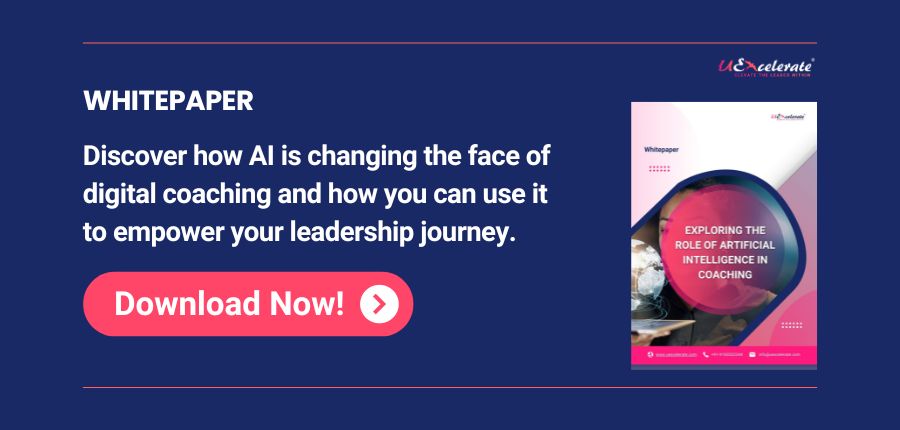Leadership has always been the cornerstone of successful organizational cultures, continually evolving and adapting to new challenges and perspectives. In today’s dynamic business landscape, executive coaching stands out as a pivotal tool in nurturing effective leadership. As we witness the rapid advancement of technology, particularly artificial intelligence (AI), we’re also seeing a transformative shift in leadership development practices.
Table of Content:
- Introduction: The Role of AI in Leadership
- AI’s Impact on Leadership Development
- How Coaching Complements AI in Leadership
- Navigating the Intersection of Technology and Human Skills
- The Future of Leadership: Balancing AI with Human Coaching
- Key Takeaways: Embracing AI and Coaching for Better Leadership
The Intersection of AI and Coaching
AI, or artificial intelligence, is when computers or machines can do things that normally need human intelligence, like learning from experiences, recognizing patterns, making decisions, or understanding languages. It’s like teaching a computer to think and learn on its own!
As artificial intelligence rapidly evolves and the AI hype continues to unfold, researchers and stakeholders are actively exploring innovative integration methods across diverse fields. Notably, coaching practices are not exempt from this transformative wave. In the practice of coaching, there’s a focus on active learning to develop the soft skills of employees, such as leadership development, time management, emotional intelligence, communication etc., which are often overlooked but very important. Recognizing AI’s potential to be an ally in filling in the gaps in learning these soft skills is being studied and developed. AI is being seen as a way to revolutionize the traditional coaching methodologies and enhance coaching outcomes, different approaches have emerged: AI-supported coaching, AI-augmented coaching, and AI as the coach represent different ways to leverage AI in coaching, each offering unique benefits and challenges. By embracing AI-driven technologies, coaches can unlock new possibilities for supporting leadership growth and driving positive outcomes in the coaching journey.
AI in Leadership Development
Leadership development is a highly demanded skill. Coaching as a practice is used a lot by leaders. Reason being: navigating the ever-changing landscape of the world, technology, teams, and employees presents a formidable challenge in leadership and the leaders often find themselves at a difficult point and need someone to help them. Over 90% of our users are executives from different industries. We have seen that the benefits of leadership coaching are indeed well received.
What if you combine Leadership development with AI?
As AI and coaching continue to evolve, traditional face-to-face interactions are becoming a thing of the past in leadership development. The emergence of digital coaching platforms and AI technology is reshaping the landscape at a rapid pace. AI offers the promise of personalized coaching plans, data-driven insights, enhanced accessibility, and scalability. Organizations are increasingly open to adopting AI-powered Leadership development platforms with coaching to boost leadership capabilities, foster organizational growth, and effectively navigate the challenges of the modern business environment.
Future Trends: AI-Powered Leadership Journey
Looking ahead, AI holds tremendous potential in revolutionizing coaching journeys. Personalized coaching algorithms, AI-augmented platforms, and integration with other transformative technologies are on the horizon. These advancements promise to empower leaders with unprecedented precision and insight, driving meaningful and impactful development experiences.

Challenges and Limitations
While the potential of AI in coaching is vast, it also presents challenges and limitations that must be addressed. Data privacy concerns, dependence on technology, potential loss of the human touch, and ethical considerations are some of the key challenges associated with AI in coaching. By acknowledging and addressing these challenges, stakeholders can harness the full potential of AI in coaching while ensuring responsible and ethical implementation.
1. Data Privacy Concerns: AI coaching faces challenges in safeguarding sensitive personal data, requiring a focus on data security and compliance with regulations like GDPR to protect coachee privacy.
2. Dependence on Technology: The risk of overreliance on AI tools in coaching may overshadow human expertise and empathy, necessitating a balance between leveraging AI capabilities and preserving the human touch.
3. Potential Loss of the Human Touch: Integrating AI in coaching raises concerns about mimicking human connections without the depth of empathy and emotional intelligence, emphasizing the importance of maintaining authentic relationships.
4. Ethics: The ethical integration of AI in coaching demands addressing biases in algorithms, ensuring transparency in decision-making, and prioritizing coachee well-being and autonomy to uphold ethical standards and psychological safety.
Final thoughts
AI represents a transformative force in the field of coaching, offering new opportunities for personalized development, data-driven insights, and enhanced accessibility. By understanding the importance of AI in leadership development, exploring its intersection with coaching, and embracing future trends, organizations can navigate the evolving landscape of AI-enabled coaching effectively. As we embrace the possibilities of AI in coaching, we pave the way for a future where human expertise and technological innovation converge to create meaningful and impactful leadership development experiences.
We have released an in-depth resource on Exploring the role of AI in Coaching, you can download from here to read the full report.
















